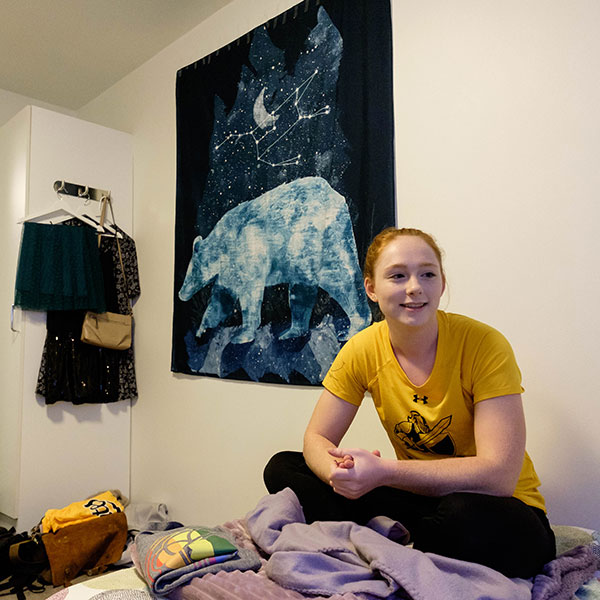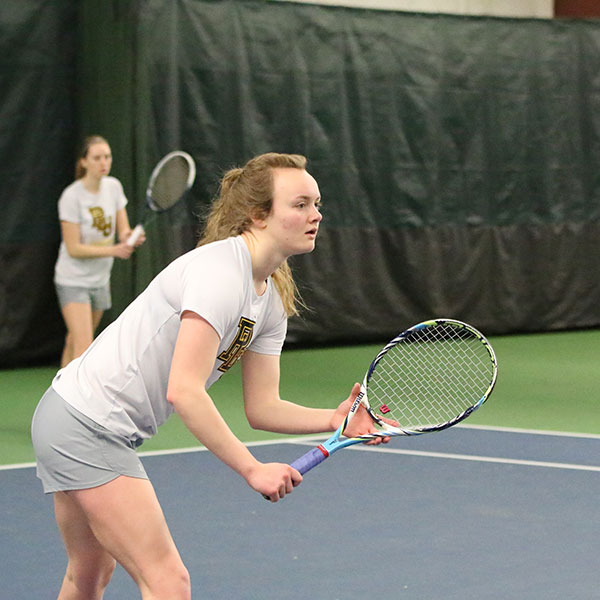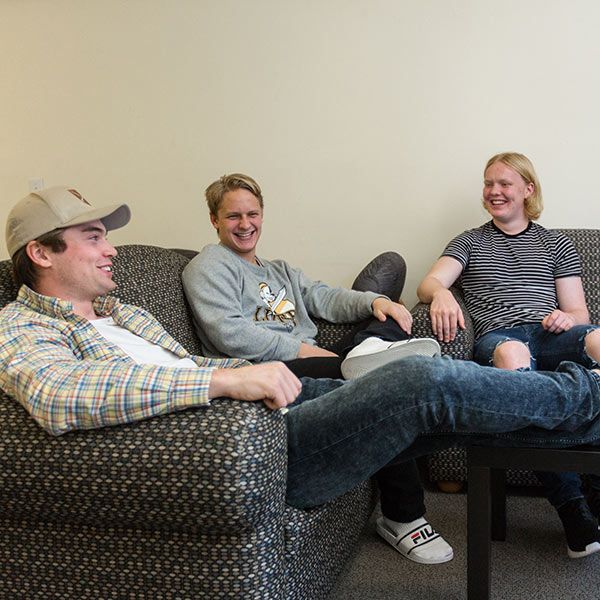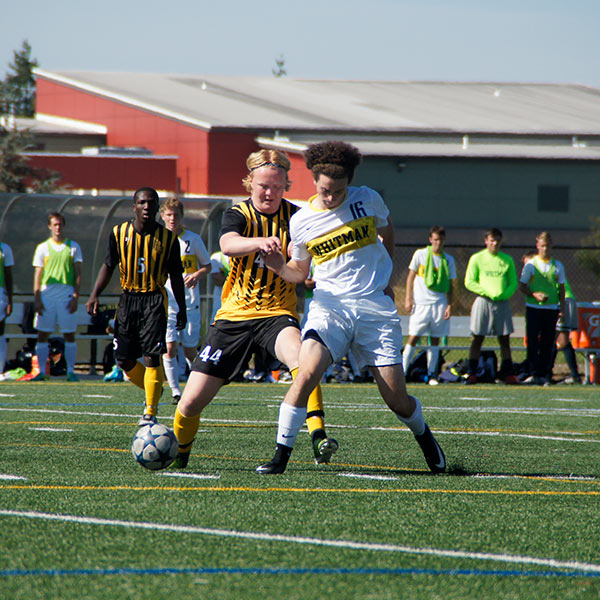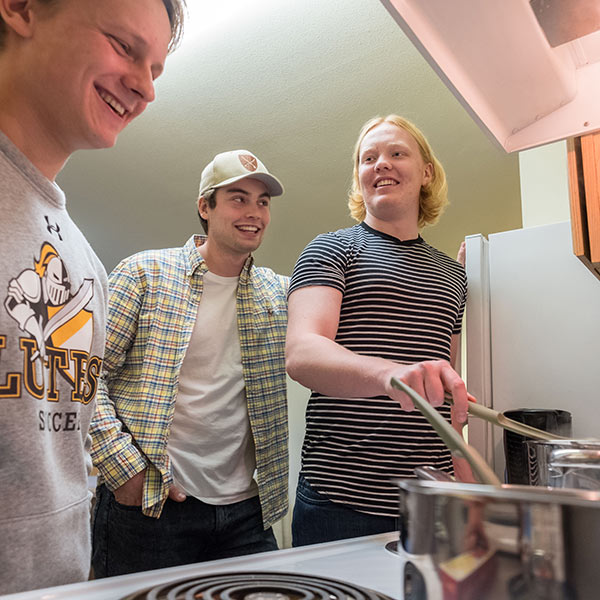They traveled more than 4,500 miles from home to study away, but two women on the Pacific Lutheran University rowing team still managed to find an erg.
Molly Ivey ’20 and Kylee Dickinson ’19 couldn’t be on the water training with their teammates in the fall, but discovering the indoor rowing machine at a gym in Oslo, Norway, was a start.
“We kind of lucked out,” Ivey said halfway through her study away program. “Kylee and I both have memberships to a gym down the street.”
That’s where their observant classmates discovered the hard-to-find equipment, to the rowers’ delight, just a short distance from the Bjørknes University College campus where the pair studied international relations as well as peace and conflict studies. Throughout fall semester, they stuck to the regular workout plan sent by head rowing coach Andy Foltz.
“That’s nice because I don’t have to modify,” Ivey said.
The erg — short for ergometer — was one of the many ways Ivey stayed fit in preparation for the spring rowing season that sneaked up on her shortly after she returned to PLU in January. In addition to following the coach’s workouts, she ran around the city and lifted weights several times a week.
Despite the solid strategy, Ivey still missed working out alongside her teammates. “It’s hard knowing that you’re not doing the exact same workout,” she said. “I’m really nervous that I’m going to be out of shape.”
Being so far away, she also missed the opportunities for team bonding and camaraderie.
“Team dynamic, that’s what I miss the most,” she said at the time, adding that she especially missed the early mornings watching the sunrise over American Lake.
“It’s hard being away from that,” she said, sitting on the bed in her Oslo apartment. “The 5:30 start is death, but it’s worth it on a gorgeous day when Mount Rainier is out.”
Roughly 90 miles southwest from Oslo, Kristi Floyd ’19 dealt with similar challenges.
The PLU tennis player left her racket at home before traveling to the Bø, Telemark, campus of University College of Southeast Norway. She figured the weather wouldn’t be ideal for tennis during her fall semester away studying alpine ecology (she was right).
“I’m worried about not playing for a really long time, but I’m managing to stay in shape,” she said midway through the semester. “I’ll just have to work really hard in January.”
Despite an ocean separating her from the team, Floyd had the help of fellow PLU student Jackie Stenberg ’19.
“Jackie’s been my workout buddy,” Floyd said. “She keeps me accountable. She’s a lot better at planning workouts than I am.”
The pair did sprints and workouts at the campus track, as well as hikes and running. They also participated in some competitive sports, including handball, a popular Norwegian team sport.
“Those are always fun because it’s competitive, but not hardcore competitive,” Floyd said. “A lot of the international students play.”
Still, the workouts aren’t a replacement for the real thing, she said. “Our coach would check in on us and make sure we went to the gym so many times a week,” Floyd said. She admits that while Stenberg helps with accountability, she isn’t as strict with it as head coach Lorrie Wood.
Despite the many challenges being away from their teams, Floyd and Ivey stressed that their study away experiences were worth the sacrifices.
Ivey said her global studies major requires her to experience the world beyond campus. “That’s why I chose PLU in the first place, to study away,” she said. “I didn’t come to PLU to row.”
Her time at Bjørknes gave her new vantage points to examine academic topics, she said. “It’s a different perspective on international politics than you get in the U.S.,” she said. “We’re looking at certain issues from an outside perspective. That’s the most interesting.”
For Floyd, the Telemark program was the perfect marriage of all her interests. Growing up, her mother — who is half Norwegian and half Swedish — shared a lot of Norwegian traditions with her. She wanted to study in Norway to reconnect with those roots, and her biology-environmental studies double major lined up well with the curriculum. “It just worked out so well with everything,” she said of the program.
The cherry on top was the small town with lots of outdoor recreation opportunities. “You can walk around in a half hour,” she said of Bø, a village of nearly 6,000 people. “It’s gorgeous here. I’m not a big city person.”
Additionally, Floyd’s coach was very supportive of her desire to travel abroad: “She’s really supportive of global education.”
Three Norwegian international students studying at PLU say similar support on the Parkland campus helped with their transition. Unlike Ivey and Floyd, their study-away experience collided with their student-athlete experience as members of the men’s soccer team, which earned co-champion status in the Northwest Conference this year.
“He’s taking good care of us,” Filip Askildt ’20 said of head coach John Yorke.
Askildt and his roommate, Axel Arentz ’20, grew up together in Drammen, Norway, just outside Oslo. Ola Kvindesland ’20 is from Stavanger, a coastal city about 320 miles from the hometown of his Norwegian teammates.
All three shared similar experiences upon arriving at PLU. Among them is their difficulty with the word “soccer” — used to describe a sport they know as football.
“I make that mistake a lot,” Askildt said, laughing.
“It’s football,” Arentz quipped. “That’s what we’ve used.”
Even the Americans at the international school Kvindesland attended called it football.
Jokes aside, the three international students acknowledged the cultural differences created challenges in the beginning.
Upon arriving at PLU, all of them said they noticed the American players prioritized competition over fun. Prioritizing the latter is a key value in the Norwegian sporting world.
“Building fun around the team, that’s important,” Arentz said. “People are very serious here. It’s more fun to play when it’s not so serious.”
Askildt agreed, adding that the training also was more intense than he was used to. He suspects it may be one reason he injured his hip flexor and quad, which kept him out for the season.
Still, despite the cultural differences, all three players say the close relationships they built with their teammates helped ease homesickness and culture shock.
“The guys have taken us in with open arms,” Askildt said. “All the teammates are good friends.”
They use the differences as an opportunity to introduce the Americans to some Norwegian culture, such as teaching them Norwegian words — including some meant for exhibiting frustration on the field, one of them reluctantly admitted, without offending English-speaking referees or bystanders.
“It’s been a good experience for the Norwegians and Americans to intermix,” Kvindesland said. “It’s a clash of cultures.”
The most fun — and likely the loudest — result of the clash has morphed into a new routine. The team blasts the Russian electronic dance song “Our Feet Are Dancing Themselves” before every practice and game, sometimes multiple times, to pump up the players. They adopted the tune from their new European friends.
“It was really catchy to everyone,” Askildt said with a smile. “It became a tradition.”
Homesickness still comes up sometimes, despite their best efforts. Askildt stressed that soccer is a big reason he’s content at PLU.
“Every time I play soccer or am around the team,” he said, “I forget about home.”
Kvindesland agrees. He said it’s an indicator that, despite the differences between the Americans and the Norwegians, “we probably aren’t as different as we think.”


